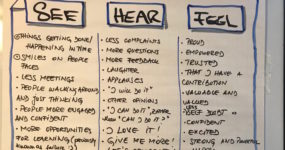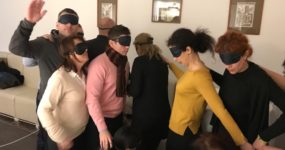5 Ways to Create Powerful Learning Experiences in the Work Place
We’ve all been there. The nondescript, blue-carpeted training room; colleagues checking their phones and drinking bad coffee from paper cups. The never-ending PowerPoint slides with bulleted lists; the coffee break when everyone rushes off to make that all-important client call. There are 100 things you know you would rather be doing than sitting in another training session that has been foisted upon you.
Globally, companies spend over $359.3 billion a year (Top Training Companies™ data, 2017) to ensure their employees:
- have the right skills for the job
- meet their industry’s increasing compliancy regulations
- develop and grow as professionals, managers and leaders
That’s a multibillion-dollar reason for ensuring learning is not just a tick-box exercise. And there’s more.
We know that learning and career development are primary drivers of employee satisfaction. This is important because it relates to an employee’s intent to stay with the organisation. Should they choose to leave, it would ultimately have an impact on the business. ‘Lack of professional development’ is often cited on employee exit forms as one of the top reasons why people decide to move on.
So how can organisations develop, engage and retain talent by investing in meaningful in-company learning experiences?

Learning is personal. Learning happens when there is a need, a desire and a connection. Participants need to have a personal rationale: “Why do I need it? What will I gain? What is my desired outcome?” and “What is my team’s desired outcome?” Then there is the emotional aspect: “Does it feel like the right thing to do? Does it support my outcomes, my big WHY? What opportunities will this give me? Does it sound interesting? Only then can an individual make a real connection with the learning: “Is it relevant to my work? Will I use it? How can I apply it? Do my peers and managers understand the learning path I am on?
Working with the learning provider to understand individual needs and desires, and ultimately a logical and emotional connection, should form part of the diagnostics and pre-learning communication. It will prepare the ground for the 5 factors that will make the learning experience more powerful:
#1 Move participants into a resourceful state.
First ensure the environment is as conducive to learning as possible: a spacious room with natural sunlight and naturally energy-boosting refreshments that people will want to eat and drink. Next, it’s about helping participants start and continue the sessions in a highly motivated, resourceful state for learning. In Neuro Linguistic Programming (NLP), a resourceful state is defined as ‘when a person has positive, helpful emotions and strategies available to them and is operating from them behaviorally.’ An effective learning consultant will have the know-how and methodologies to help participants find their resourceful state at the start of each session.
# 2 Honour uniqueness and difference
Remember learning is personal. The subject matter may be the same but delivery needs to be tailored to the individual learning styles – and abilities – of each participant. Understanding the different way people learn and being able to adapt the delivery approach to different groups is key. Tailored programs shouldn’t stop at learning styles – they should reflect the unique culture and ethos of the organisation too.
#3 Create a rich and multi-sensory learning experience

For some, learning is visual, for others’ it’s logical or experiential. Providing a rich range of multi-sensory learning materials will make the topic memorable and engaging. Do the participant manuals or handouts have the right quality, look and feel? What about the visual aids? Is the learning environment designed to inspire – to make learning happen? If there is a presentation, is it impactful? Will participants still be talking about their experience to peers and colleagues in a few weeks’ time – and for the right reasons?
#4 Keep it real
The most effective way to ensure participants feel connected to the learning experience is to show them the connections. Illustrate the points in a way that resonates with a person’s individual role, with their industry and its challenges. Good learning consultants are often great storytellers. They know how to engage participants with live business scenarios they can identify with or have read about in today’s news. How does the learning topic relate to what is happening in their world, right now, today? If possible, put aside a budget for creating company-specific video case studies showing the learning and behaviours in action.
#5 Create meaning and value
If you are anything like me, you may just remember the top three things you needed to retain…unless the content really resonates. What makes the difference in learning is the ability the learning consultant has to create meaning and value around the subject matter rather than merely impart information or knowledge. Much of this relates back to the need, desire and connection an individual has but great learning consultants will constantly be seeking ways to ensure each participant understands the value of what they are learning.
When choosing a learning partner or designing your next learning experience remember it takes more than a ‘tailored program’ label to create real impact for your employees – and your business.
Get in touch if you would like to talk about about creating more powerful learning experiences in your organisation.
Marika